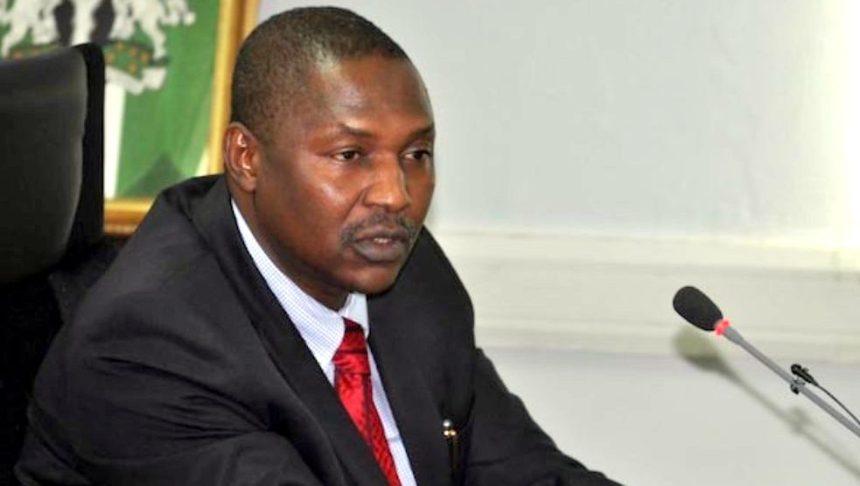Opinion
Farmer/Herder Crisis: Malami’s Panacea As Way Forward

By Jesutega Onokpasa
I found the perspectives on the farmer/hearder crisis that were recently shared by Attorney General of the Federation and Minister for Justice, Dr. Abubakar Malami, SAN, to be quite instructive and rather reassuring in this season of divisive rhetoric and rascally invective on steroids.
The Attorney General had amongst other things canvassed dialogue, stakeholder-driven solutions and more proactive government regulation as a way out of the imbroglio.
He succeeded in communicating a clear identification of the problem with a rather expansive appreciation of its unwieldy components. Most crucially, it was his submission that nomadic livestock rearing must now transit to sedentary livestock farming.
Given that the crisis would seem to have been largely viewed through rather narrow agricultural and socioeconomic lenses thus far, an intervention on the part of the nation’s chief law officer and most important Minister should serve to situate it within its more proper context as an issue of truly profound national importance.
Simply put, the nomadic approach to livestock rearing no longer enjoys comparative advantage within the geographic and socioeconomic realities of present day Nigeria.
It is not just outdated but no longer physically possible and it is actually a surprise it lasted this long for such a method of animal farming is simply unworkable against the backdrop of Nigeria’s population density and should have been thus envisaged and proactively attended to, decades ago!
It has become commonplace and somewhat fashionable to frame the farmer/herder crisis in an ethno-religious light in which the Fulani is cast in the mold of an avid practitioner of ethnic cleansing, native war, territorial conquest and irredentist machinations.
This increasingly alarming tendency to view the Fulani as an existential threat to their compatriots of other ethnicities is of course not helped at all by rather arrogant and idiotic posturing by some amongst the herders nor is it in any way calmed by clueless and quite infantile excuses intended to explain away a very serious problem by persons who ought to know better.
Yet there is actually a factual approach to the problem in which the herders, themselves, are quite easily identifiable as victims much like the agricultural communities they have pillaged right across the country from North to South. There was simply no planning, beyond lip service, for what ought to have been crystal clear would become the pathetic circumstance of the herdsman in the Nigeria that was to come, has arrived and has now overtaken us.
Indeed, the failure of successive governments to project that it would become excruciatingly impossible for the sort of animal husbandry practised in a country of 20 million people to continue without fundamental dislocations when that population grew to 200 million is simply treasonous.
What we are thus faced with is a conundrum in which both the farmer and the herder are ultimately victims of atrocious inadequacy in policy making, implementation and follow-up on the part of their government since Independence.
Mongolia at a landmass of 1.566 million square kilometers is more than one and a half times the size of Nigeria but with a population of 3.2 million it probably has fewer citizens than Bayelsa, the smallest state by population in Nigeria. It shouldn’t be at all impossible for a Mongolian herder to trek a distance similar to that between Sokoto and Sagbama and not encounter any farming community or even a single field of planted crops throughout the way!
What I always found quite perplexing is how come there is no nomadic pastoralism in the United States of America, a country of 9.834 million square kilometers, and thus, more than ten times the size of Nigeria, yet that method of raising livestock is supposed to work in Nigeria, which at 923,768 square kilometers isn’t that much bigger than Texas, just one of America’s fifty states and not even its biggest!
Not even in Brazil, a tropical country like ours, with a far much smaller population density, or in Australia, a country that is actually a continent of its own, is nomadism practiced, yet, we abandoned the herdsmen to fend for themselves while we happily kept devouring the cattle they could only keep bringing us at the ever increasing expense of the hapless farmer.
Much has been made of government intent to intervene in aid of cattle rearing with loud protestations that it is after all “a private business”. One has to wonder what then to make of government provision of fertilizers, farming implements and a myriad of similar facilities to farmers across the country.
Every agricultural economist knows well that it is utterly impossible for any nation to reliably feed itself without subsidising agriculture, be it crop or livestock farming.
Producing food is actually quite a tough act to make money from and as a general rule of global application, it is pretty difficult to profitably farm without government backing.
Probably no other sector of the national economy is more enthusiastically assisted, jealously guarded and fiercely protected than farming, even in the most free trade compliant countries and advanced economies of the world.
Whatever the ethnic jingoists and religious idiots on either side might prefer to believe, ultimately, it is at best debatable whether the Fulani really want to “take over Nigeria” by devices of conspiratorial belligerence and surreptitious jihad. What is ascertained and thus beyond debate is the fact that livestock nomadism is no longer geographically viable in Nigeria and that blame for the nationwide calamities it has thrown up lies squarely and historically with government.
We are presently met with a national predicament and certainly not a Fulani, Yoruba, farmer, herder, southern or northern problem. Needless to say, the solution to this national challenge must be driven by our national government and I recommend the Attorney General’s quite promising prescriptions for immediate exploration.
Onokpasa, a lawyer, wrote from Warri.
+2347037212475
ekwetafia@gmail.com
Send Us A Press Statement Advertise With Us Contact Us
And For More Nigerian News Visit GWG.NG


